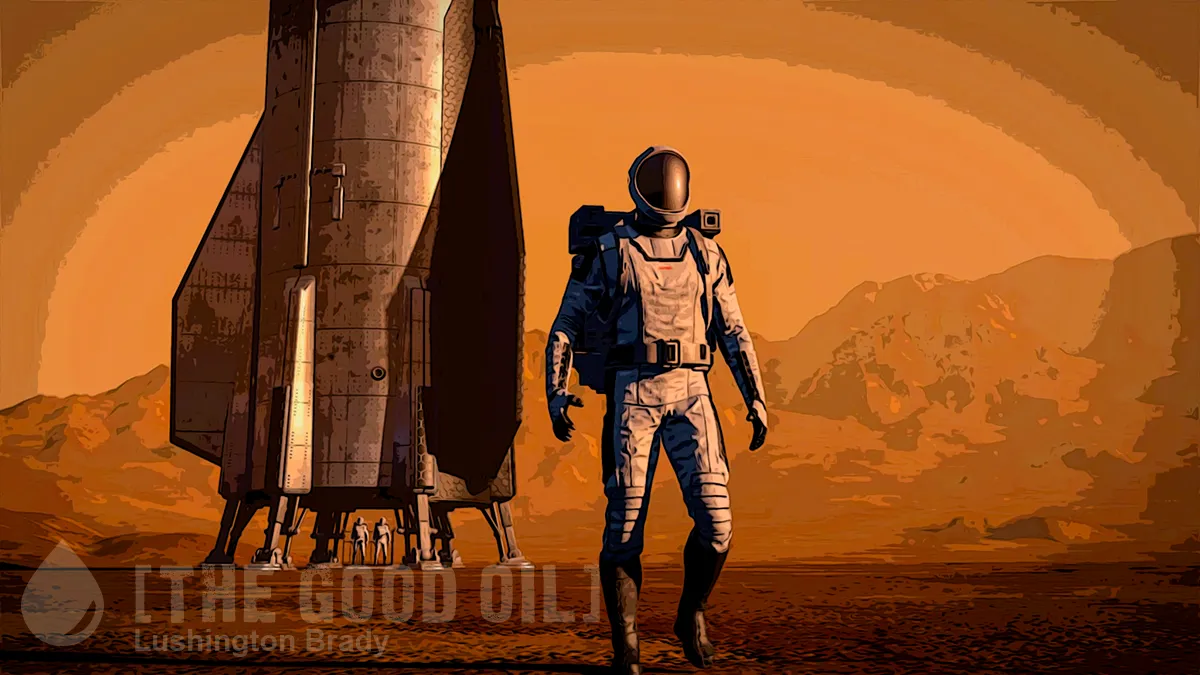Table of Contents
In his memoirs, Arthur C Clarke recalled the euphoria of the Moon Landings – and that the immediate question was, ‘So, when are we going to Mars?’ While the hubris is perhaps understandable, what such optimists failed to understand is, first, that space is big. Really big. Secondly, space is incredibly hostile to living creatures.
Both of these make taking human beings to Mars a feat orders of magnitude above hopping the short distance to the Moon. Coupled with the shifts in the Cold War that fundamentally altered the nature (and budget) of the government-funded space race, it’s no wonder that the goal of human exploration of Mars has stalled for over half a century.
Enter, private enterprise.
Billionaire tech entrepreneur Elon Musk has long made sending humans to Mars his life goal. Along the way, Musk’s SpaceX has revolutionised space travel and slashed the cost of payload delivery that had been stuck since the 1960s. But still, Mars has remained stubbornly far away, literally and metaphorically.
But the next phase in Musk’s Mars ambitions is about to dawn.
SpaceX plans to launch about five uncrewed Starship missions to Mars in two years, CEO Elon Musk said on Sept 22 in a post on social media platform X.
Earlier this month, Musk had said that the first Starships to Mars would launch in two years “when the next Earth-Mars transfer window opens.”
Here, Musk is referring to the fact that Mars, like all celestial bodies, is a constantly moving target. Due to the elliptical shape of planetary orbits, the distance from Earth to Mars varies widely, from 54.6 million to 401.4 million kilometres. Obviously, any Mars shot will aim to cross the shortest possible distance.
The planned flights in two years will be unmanned, testing the Starships’ capabilities before committing crews’ lives. By way of reference, Apollo 7 was the first manned Apollo flight and the first crewed NASA flight in 22 months.
The CEO on Sept 22 said that the first crewed mission timeline will depend upon the success of the uncrewed flights. If the uncrewed missions land safely, crewed missions will be launched in four years. However, in case of challenges, crewed missions will be postponed by another two years, Musk said.
If all goes according to this schedule, the first humans could be arriving at Mars as early as 2029. Because, of course, there is still the travel time to consider.
The trip to Mars always takes somewhere between 128 to 333 days. SpaceX already has some plans for the Red Planet, and the CEO of SpaceX, Elon Musk, stated that his Interplanetary Transport System – ITS – would reach Mars in just 80 days.
SpaceX is quite ambitious, as they believe the journey to Mars could get even less than that, just a month, to be more precise.
Musk is counting on Starship to fulfill his goal of producing a large, multipurpose next-generation spacecraft capable of sending people and cargo to the moon later this decade, and ultimately flying to Mars.
Even then, the challenges will only be just beginning. Mars ain’t the kind of place to raise your kids, as Bernie Taupin wrote.
Unfortunately, Mars’s atmosphere is made up of around 95% carbon dioxide. This means that you couldn’t breathe on the Red Planet, and you would almost instantly die of hypoxia. Apart from this, Mars is really a cold place with average surface temperatures reaching 21 degrees Celsius; however, in the night, temperatures drop to -62 degrees Celsius. The Martian dust is also dangerous to humans, as it is toxic, finely grained, and abrasive, which is terrible for our lungs if we were exposed to it.
The last thing to worry about would be radiation. Mars is full of it since its atmosphere, and lack of a global magnetic field, means that the planet is showered by radiation through high-energy cosmic rays and solar particles.
Still, there are few places and few dangers human explorers won’t brave. Hell, Captain Cook even went to Gisborne.









